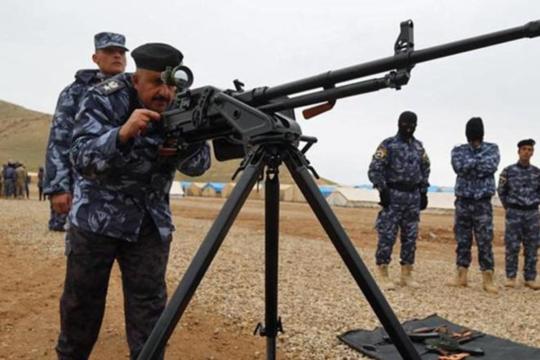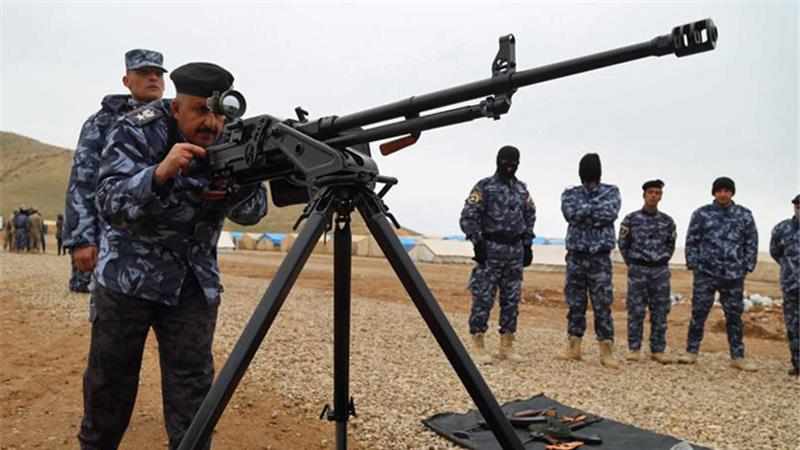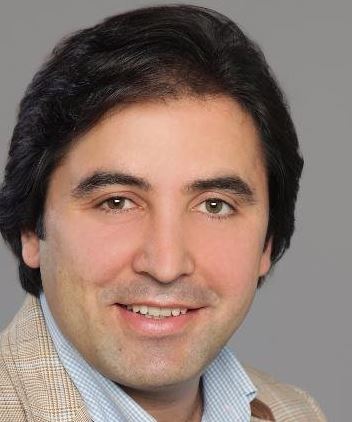
 |
| Peshmerga forces have succeeded in regaining several towns and villages from ISIL [Getty Images] |
| Abstract Beneath the euphoria and much vaunted hype of Kurdish unity as a result of the Kurdish fight against ISIS, the seeds of discord and dangerous rivalry have been planted. This rivalry, which is reminiscent of the old bloody and perilous rivalries in Kurdish politics, is taking place along two axes: on the regional setting between the Kurdistan Democratic Party (KDP) and the Kurdistan Worker Party (PKK), and within the context of the KRG between the KDP and the Patriotic Union of Kurdistan (PUK). |
Introduction
The Kurds, with the backing of international powers, have scuttled the ISIS offensive and pushed it back from Kurdish-majority territories. The climax of this pushback against ISIS came with the liberation of the Syrian Kurdish town of Kobane, which endured an ISIS siege for more than four months. Since the beginning of the Syrian imbroglio, no other place has received as much international media coverage as Kobane during the fight between the Kurds and ISIS. Thus, Kobane has acquired a symbolic significance incommensurate with its size and strategic importance. But it has also gained a special status in the Kurdish national consciousness. Nationalism and nationalist projects are, as Michel Foucault calls them, ‘discursive formations’, meaning ways of speaking that shape people’s consciousness, heavily informed by symbolism including ‘historical’ narratives, social solidarity, a common identity, a common culture, a common creed, shared heroes, etc., which are threaded together and given meanings through a particular way of speaking and narrating.(1) In this respect, the fight over and liberation of Kobane has provided the Kurdish national(ist) project with a significant narrative together with new images and symbolism.
In this regard, just as the initial ISIS onslaught against the Kurds ushered in a “Kurdo-pessimism”, this turn of events has caused this initial pessimism to give way to an unprecedented level of euphoria among Kurds. Much-hyped ideas of Kurdish unity and the international prestige of Kurdish politics have dominated the headlines in publications linked to the Kurdish national movement. Beside these examples from the political class, some scholars of Kurdish affairs have claimed that the Kurds have never before attained such a level of influence in regional politics and international legitimacy.(2) Such analyses encouraged and confirmed Kurds in their self-confidence and self-congratulation, resulting in an increased sense of empowerment among the Kurdish political class in Turkey, talk of imminent independence among Iraqi Kurds, and an upbeat and victorious mood among Syrian Kurds.
Though it is valid to say that the fight against ISIS has bestowed further legitimacy upon the demands and aspirations of Kurdish national movements, has opened the way for the professionalization of its armed forces, especially in Kurdistan Regional Government (KRG)-run areas and has led to the emergence of a common Kurdish public sphere, one still should be wary of bold pronouncements that “the Kurdish time has arrived” and prevalent euphoria. Neither should this over-enthusiasm conceal other trends that have been ushered in by the same process, and which present the possibility of drastic consequences. The seeds of a menacing rivalry between different Kurdish factions, which could upset all Kurdish political calculations, have been sown. Though Kurds have travelled a long way from the internecine conflicts of the 1990s, they are not yet immune to the possibility of deadly rivalries erupting among themselves.
Beneath the euphoria and much vaunted hype of Kurdish unity, the seeds of discord and dangerous rivalry(3) have been planted. This rivalry, which is reminiscent of the old bloody and perilous rivalries in Kurdish politics, is taking place along two axes: on the regional setting between the Kurdistan Democratic Party (KDP) and the Kurdistan Worker Party (PKK), and within the context of the KRG between the KDP and the Patriotic Union of Kurdistan (PUK).
Who will define the future of the KRG?
On the KRG level, the KDP and PUK, as the two traditional ruling parties of Iraqi Kurdistan, have been engaged in a simmering rivalry. As the KDP has progressively come to dominate Kurdish politics, and as the PUK has gradually lost ground to the Gorran Movement, a splinter group originating from the PUK, the PUK feels cornered, especially in Sulaymaniyah province by the Gorran and by the KDP in the KRG, and it is searching for ways to regain some of its losses. It believed that ISIS’s early offensive against the Kurdish forces in Iraqi Kurdistan in August/September provided such an opportunity. The Peshmerga’s(4) initial retreat and move back from some of the areas attacked by ISIS with the ensuing loss of territory and lives gave the PUK an advantageous public standing, since thesePeshmergas are seen as belonging to the KDP.(5) As the KRG's prestige and public standing was dented by these attacks, the PUK tried to frame this early setback as the KDP's inability to stand for Kurdish lives, rights and the Kurdish cause. Moreover, while it cast its struggle in the lexicon of a national cause, it framed the KDP’s cause as that of tribe and party. If this rhetoric continues, this drive by the PUK to reclaim its waning influence in Kurdish politics might cause serious friction with the KDP with dire consequences for Kurdish politics in Iraq.
KDP – PKK axes: a struggle to dominate regional Kurdish politics
Second, another rivalry is taking place along PKK and KDP lines in regional Kurdish politics.(6) The historical roots of discord between the PKK and KDP go back to the late 1980s and the 1990s. Informed by power struggles, factional and ideological differences and competition, this discord claimed thousands of lives on both sides and gave further prominence to the Kurdish concept of brakuji, which literally means fratricide. Despite a relative calm in relations in 2000s, this rivalry was revitalised in the context of the Syrian civil war and the drive of both sides to dominate Syrian Kurdish politics and enclaves. In this drive, the PKK proved much more successful than the KDP. It established an almost total grip over the Kurdish enclaves in Syria, situated itself as the only credible representative of the ‘Kurdish people’ in the country, and maintained a battle-hardened fighting force on the ground. Moreover, it either expelled or imprisoned pro-KDP forces, especially targeting the leadership of the group in Rojava, the Kurdish term that refers to the Kurdish part of Syria. This further intensified the already tense relations between PKK and KDP. The President of the KRG and chairman of the KDP, MasoudBarzani, responded by closing down the border between the KRG and Rojava, cutting off significant supply and economic lifelines to the region, with an attendant acrimonious exchange between the two sides. The first of many casualties of this rivalry was the repeated delaying of the convention of the much vaunted Kurdish National Congress in Erbil to strike a modus vivendi among Kurdish groups and chart a direction for Kurdish politics in the Near East.
This picture and psychology has temporarily been changed by the fight against ISIS in Iraqi and Syrian Kurdistan with ensuing cross-border cooperation between the PKK and KDP. The PKK came to the aid of the KDP and other Kurdish groups in the KRG and the KRG reciprocated by coming to the aid of the PKK/PYD in Kobane, creating a new dynamism in relations. This process has been buttressed by political pressure on the political elite from an emerging common Kurdish public to devise a common position and undertake cooperation in a regional setting. Such cooperation has proved significant for pushing back ISIS, reclaiming some of the lost territory and securing US/Western military equipment and assistance for PYD forces in Rojavaby using the KDP/KRG as a conduit. Moreover, this amicable and cooperative atmosphere was further bolstered by the signing of the Duhok agreement, brokered by Barzani between different Syrian Kurdish groups. This agreement envisioned cooperation between and the adoption of a common position by signatory parties with the aim of establishing a common integrated military structure in Rojava.(7)
Yet this picture has suffered a setback in the form of the PKK's recent announcement that Shingal province, which is inhabited by Yazidi Kurds and located in the KRG, should declare its own cantonal administration, mirroring the PKK instituted, administrated, and maintained cantonal structure in Rojava. This declaration has been and will be seen by the KDP as a direct intrusion by the PKK into the KRG's domestic politics in order to seek a foothold for itself on KRG territory. Hence, this move is likely to drive a wedge between the two parties. In fact, the KRG has warned the PKK against interfering in Shingal and attempting to turn it into a canton under its own influence. “We want to announce that the current PKK attempts to create a canton for Shingal is unlawful and is completely contradictory with the laws of the Iraqi state and the Kurdistan Region, and they must stop these interventions inside the Kurdistan Region, as Shingal is part of the disputed areas in the Iraqi constitution,” the KRG said.(8)
Moreover, this move is likely to elicit a similar response from the KDP in the form of an increased effort by the KDP to have its offshoot organization in Kurdish part of Turkey to disturb the PKK’s hegemony over Kurdish politics in Turkey. In other words, if the PKK continues to seek an oppositional role for itself against the dominance of the KDP in the KRG, the KDP will have an enhanced motivation to situate itself as an oppositional force against the hegemony of the PKK over Turkey’s Kurdish politics through its offshoot organizations.
A common Kurdish public sphere: a cause for cooperation or competition?
As seasoned analysts of Kurdish affairs have also argued, it seems that the PKK's motivation for establishing a de facto presence or gaining the upper hand in Shingal is three-fold. First, it is competing for primacy with the KDP in Rojava (in which it has proved much more successful than the KDP), and it regards asserting influence over the land that borders Rojava in the KRG as being of utmost importance. Shingal has enormous strategic value in the PKK's calculations. Second, by emphasising its role as the saviour of a minority religious sect, i.e. the Yazidi Kurds, the PKK believes it will -acquire further international legitimacy. Third, Shingal will provide the PKK with another foothold on KRG soil and a reason to play a role in internal KRG politics, hence squeezing its main competitor, the KDP, on a regional scale.(9) Though ferociously resisted by the KDP, the PKK’s approach has neither received criticism from the PUK nor Gorran, reflecting the fact that it is the PKK and KDP that are the main contenders for primacy in Kurdish politics in the Near East.
Third, as a common Kurdish public sphere is emerging, most of the Kurdish movements have gradually begun to adopt a pan-Kurdish agenda, in place of more localised concerns they previously had, which largely restricted their political activities and ambitions to the nation states within which they were operating, or against whom they were struggling. Therefore, the common Kurdish public sphere has provided new opportunities for Kurdish politics in the Near East, but it has also provided ample causes for friction among Kurdish groups as most feel pressure to appeal to the larger Kurdish public to justify their political activities. This cause of friction is still a theoretical one and hasn’t materialized yet. The political skills and dexterity of Kurdish politicians will decide whether this common Kurdish public sphere will be utilized as a reason for further cooperation or cause a rift between different Kurdish factions.
All in all, the fight against the ISIS has served both as an opportunity but also a menace to Kurdish politics in the Near East. A sole focus on the opportunities prompted by this fight will not present a complete and accurate picture of the strengths and weaknesses of Kurdish politics in the regional setting. An informed and impartial observation requires attention to be paid to sources of friction unleashed as a result of the fight between Kurds and ISIS. Yet, it is eventually the will and deftness of Kurdish politics that will decide as to which scenario will prevail in the Kurdish politics in the region.
________________________________________________________
Copyright © 2015 Al Jazeera Centre for Studies, All rights reserved.
*Galip Dalay is a Senior Associate Fellow on Turkey and Kurdish Affairs, Al Jazeera Center for Studies.
Endnotes
1) Craig Calhoun, Introduction, Nationalism, (Buckingham: Open University Press, 2002), p. 3.
2) See the Rudaw interview with David L. Philips, director of Columbia University’s Peace and Human Rights Studies, “KürtBahar?’n?nyazar?: Kürtlerhiçbukadargüçlenmemi?ti!”, Rudaw, 06 February 2015, http://rudaw.net/turkish/interview/06022015 (accessed on 10 February 2015)
3) See the following article for a similar judgement on unleashed rivalry among Kurdish factions, RanjAlaaldin, “A dangerous rivalry for the Kurds”, New York Times, 16 December 2014, http://www.nytimes.com/2014/12/17/opinion/a-dangerous-rivalry-for-the-kurds.html?_r=0 (accessed on 10 February 2015)
4) Peshmerga is Kurdish terminology used to refer to Iraqi Kurdish military forces. This term literally means "one who confronts death".
5) For a good report on the impact of the peshmerga’s initial retreat from their posts in the face of ISIS onslaught on Iraqi Kurdish politics in general and the intra-Kurdish rivalry in particular, see Dexter Filkins, “The fight of their lives”, New Yorker, 29 September 2014, http://www.newyorker.com/magazine/2014/09/29/fight-lives (accessed on 10 February 2015)
6) See the strongly worded warning from the Kurdistan Communities Union (KCK), an umbrella organization of pro-PKK groups, aimed at the KRG in general and the KDP in particular. In the statement the KCK “called attention to the hidden and dirty policy and propaganda recently pursued in South Kurdistan (meaning KRG) against the PKK.” As a response, the KCK threatened to withdraw PKK forces from the KRG. See the news, KCK: We are discussing to withdraw the guerrilla forces fighting ISIS, ANF News, 08 February 2015, http://anfenglish.com/news/kck-we-are-discussing-to-withdraw-the-guerrilla-forces-fighting-isis#.VNfB3f-lpBM.twitter (accessed on 10 February 2015)
7) “Divided Syrian Kurds reach deal in the face of ISIS threat”, Rudaw, 22 October 2014, http://rudaw.net/english/kurdistan/221020141 (accessed on 10 February 2015)
8) “Erbil warns PKK it will not brook ‘external interference’ in Shingal”, Rudaw, 17 January 2015, http://rudaw.net/english/kurdistan/17012015 (accessed on 10 February 2015)
9) RebwarKerimWeli, “KDP’denkantonacevap” Rudaw, 01 February 2015, http://rudaw.net/turkish/opinion/01022015 (accessed on 10 February 2015)
